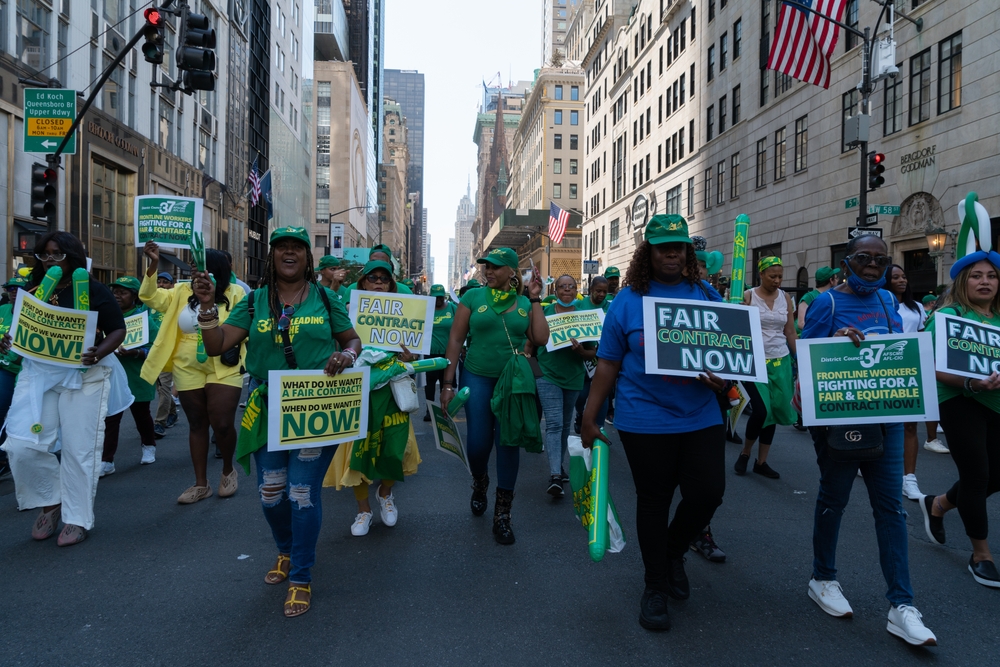
In the weeks since ProPublica revealed the previously undisclosed deep ties between Justice Clarence Thomas and billionaire Nazi memorabilia-collector Harlan Crow, we’ve heard the same line over and over: Crow doesn’t have interests before the Supreme Court, so we should just ignore this rampant corruption. This illogical excuse is not only factually wrong — Crow has directly had business before the court during Justice Thomas’ tenure — it also ignores the simple fact that billionaires like Harlan Crow don’t need to be a party in a case to have business before the Court. Justice Thomas has consistently used his position on the Court to change American jurisprudence in favor of the wealthy and powerful, like Crow and his billionaire friends, at the expense of working people.
In fact, Thomas has doubled down on this approach even in the wake of these damning corruption allegations. Last Thursday, Justice Thomas joined the majority’s decision in Glacier Northwest v. International Brotherhood of Teamsters, a case centered on unionized cement truck drivers who initiated a work stoppage as part of their fight for a fair contract. As a result, their employer was not able to deliver the remaining cement, causing some to spoil. The company sued for damages for the lost cement, arguing that the union imposed economic hardship, which is the entire point of strikes and other workplace actions that are protected under the law. Justice Barrett, writing for the majority, sided with the company and, in doing so, made it easier for corporations to sue striking unions for economic losses. Justice Thomas, however, notably made it clear that he would have gone even further to limit the reach of the National Labor Relations Act and weaken unions.
His decision in this case follows a clear trend: When Justice Thomas can choose between workers and their employers, he almost always sides with employers. Another example was the case Genesis Healthcare Corp. v. Symczyk, decided in 2013, in which an employer offered to satisfy the plaintiff’s individual claim over unpaid wages after she filed a collective action suit. She did not respond to the offer, later arguing that her employer was only attempting to avoid the collective action suit by making her settle. In a 5–4 opinion authored by Justice Thomas, the Supreme Court ruled for the employer, holding that a collective action suit cannot survive when an individual claim is satisfied without other workers coming forward to take part, weakening plaintiffs’ ability to bring collective action claims under the Fair Labor Standards Act (FLSA).
Unions are popular with most Americans – 71% of Americans support unions and 16 million workers are represented by unions. But the Supreme Court has repeatedly ruled to weaken them, including not only their most recent decision but also last year’s Cedar Point Nursery v. Hassid and 2018’s Janus v. AFSCME. If you asked Justice Thomas whether his support for all these anti-union rulings has had anything to do with his “friendship” with billionaire Harlan Crow, he’d likely say no. That doesn’t change the fact that decisions weakening unions and worker protections almost always will make billionaires even richer.
Cases like these do more than weaken unions; they cause tangible financial harm to the workers protected by collective bargaining agreements. A recent report from the Center for American Progress found that working-class union households have almost four times as much wealth as working-class nonunion households, with working-class families of color benefitting the most from union membership. In fact, there is a 13% higher rate of homeownership among working-class union households. Without union protections, these signs of growth and sustainability for working-class families diminish. Weakened unions means poorer wages, working conditions, and benefits — all amounting to a poorer quality of life for the workers the country depends upon.
When workers suffer, it is billionaires who profit. The higher wages that come with union membership cost companies more money, reducing profit and therefore the wealth of those who run and own them. On the other hand, profits increase when workers receive lower wages and have little to no means to demand higher pay or workplace protections. Exploitation may be good for business, but it’s terrible for the general welfare.
Across the nation, workers are engaging in collective action to demand fair working conditions, benefits, and pay. This year, Starbucks baristas, screenwriters, and journalists are just some of the workers to go on strike who have garnered public attention. In each one of these cases, corporations with more than enough resources to support their workers are instead resorting to union-busting activities and a refusal to negotiate. These tactics and choices aren’t new. Between 2016 and 2021, employers threatened to cut benefits or wages in 26% of all workplaces attempting to unionize. Anti-labor rulings by Justice Thomas and the Court’s conservatives make such behavior easier and more tempting for employers.
Billionaires always have business before the Supreme Court. Decisions like Glacier Northwest weaken workers’ ability to collectively bargain, making it easier for companies to exploit them for profit. That benefits Justice Thomas’ billionaire friends — who make sure that Justice Thomas enjoys the perks of their extreme wealth by inviting him to gallivant on their private yachts, among other lavish activities. These decisions are bad for workers, they’re bad for our democracy, and they reveal the substantial impact of this Court’s prioritization of the wealthy to the detriment of the working class.
Mari Nemec is a Dorot Fellow at Alliance for Justice.

